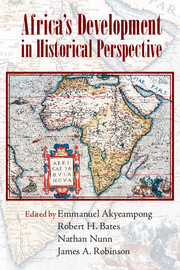Book contents
- Frontmatter
- Contents
- Author Biographies
- Acknowledgments
- Introduction
- Part I La Longue Durée
- Part II Culture, Entrepreneurship, and Development
- 5 Redistributive Pressures in Sub-Saharan Africa: Causes, Consequences, and Coping Strategies
- 6 Accumulation and Conspicuous Consumption: The Poverty of Entrepreneurship in Western Nigeria, ca. 1850–1930
- 7 Commerce, Credit, and Mobility in Late Nineteenth-Century Gold Coast: Changing Dynamics in Euro-African Trade
- 8 The Textile Industry of Eastern Africa in the Longue Durée
- 9 Explaining and Evaluating the Cash Crop Revolution in the “Peasant” Colonies of Tropical Africa, ca. 1890–ca.1930: Beyond “Vent for Surplus”
- 10 Reinventing the Wheel: The Economic Benefits of Wheeled Transportation in Early Colonial British West Africa
- 11 Mbanza Kongo/São Salvador: Culture and the Transformation of an African City, 1491 to 1670s
- Part III Institutions
- Part IV External Forces
- Index
- References
5 - Redistributive Pressures in Sub-Saharan Africa: Causes, Consequences, and Coping Strategies
Published online by Cambridge University Press: 05 September 2014
- Frontmatter
- Contents
- Author Biographies
- Acknowledgments
- Introduction
- Part I La Longue Durée
- Part II Culture, Entrepreneurship, and Development
- 5 Redistributive Pressures in Sub-Saharan Africa: Causes, Consequences, and Coping Strategies
- 6 Accumulation and Conspicuous Consumption: The Poverty of Entrepreneurship in Western Nigeria, ca. 1850–1930
- 7 Commerce, Credit, and Mobility in Late Nineteenth-Century Gold Coast: Changing Dynamics in Euro-African Trade
- 8 The Textile Industry of Eastern Africa in the Longue Durée
- 9 Explaining and Evaluating the Cash Crop Revolution in the “Peasant” Colonies of Tropical Africa, ca. 1890–ca.1930: Beyond “Vent for Surplus”
- 10 Reinventing the Wheel: The Economic Benefits of Wheeled Transportation in Early Colonial British West Africa
- 11 Mbanza Kongo/São Salvador: Culture and the Transformation of an African City, 1491 to 1670s
- Part III Institutions
- Part IV External Forces
- Index
- References
Summary
Introduction
A widespread idea in the development economics literature of the past decades is that personalized relationships and social networks play an important role in the spontaneous evolution of institutions required for rapid growth, such as contract enforcement mechanisms and property rights (see, e.g., Aoki 2001; Bates 2001; Fafchamps 2004; Greif 2006; Hayami and Kawagoe 1993; North 1990; Platteau 2000). An intriguing question, which is rarely raised, is how to reconcile such a view with the well-known Weberian/Marxian thesis that the development of market societies is based on the rising autonomy of the individual and his (her) emancipation from the matrix of erstwhile social agencies.
This question has several aspects. Although personalized relationships allow good circulation of information, they do not necessarily create the best conditions for the impartial meting out of sanctions against rule violators, thereby undermining the effectiveness of reputation mechanisms (Baland, Somanathan, and Wahhaj 2013; Hoff and Sen 2005; Platteau 2000, chapter 6). Moreover, if traditional codes of honor prevail, even the informational advantage of personalized relationships can be disputed: thus, a lot of secrecy surrounds economic transactions if, in the event of rule breaking (think of loan delinquency), people are wary of not bringing shame on resident families with whom they are in continuous interaction, or if they are eager to conceal acts of malfeasance of which they have been the victims because such a revelation would undermine their reputation as strong persons (Platteau 2000, chapter 6). A cheated person may also refrain from leaking out the information if he (she) does not wish to protect other community members, say, because he (she) wants them to be harmed in the same way as he (she) has been. Finally, to the extent that norms based on values of generosity, sociability, and hospitality tend to prevail among closely related persons, relatively successful members of social groups or networks would face internal pressures to redistribute their incomes, which would create strong disincentives to apply effort, take risks, and accumulate capital.
- Type
- Chapter
- Information
- Africa's Development in Historical Perspective , pp. 153 - 207Publisher: Cambridge University PressPrint publication year: 2014
References
- 21
- Cited by



